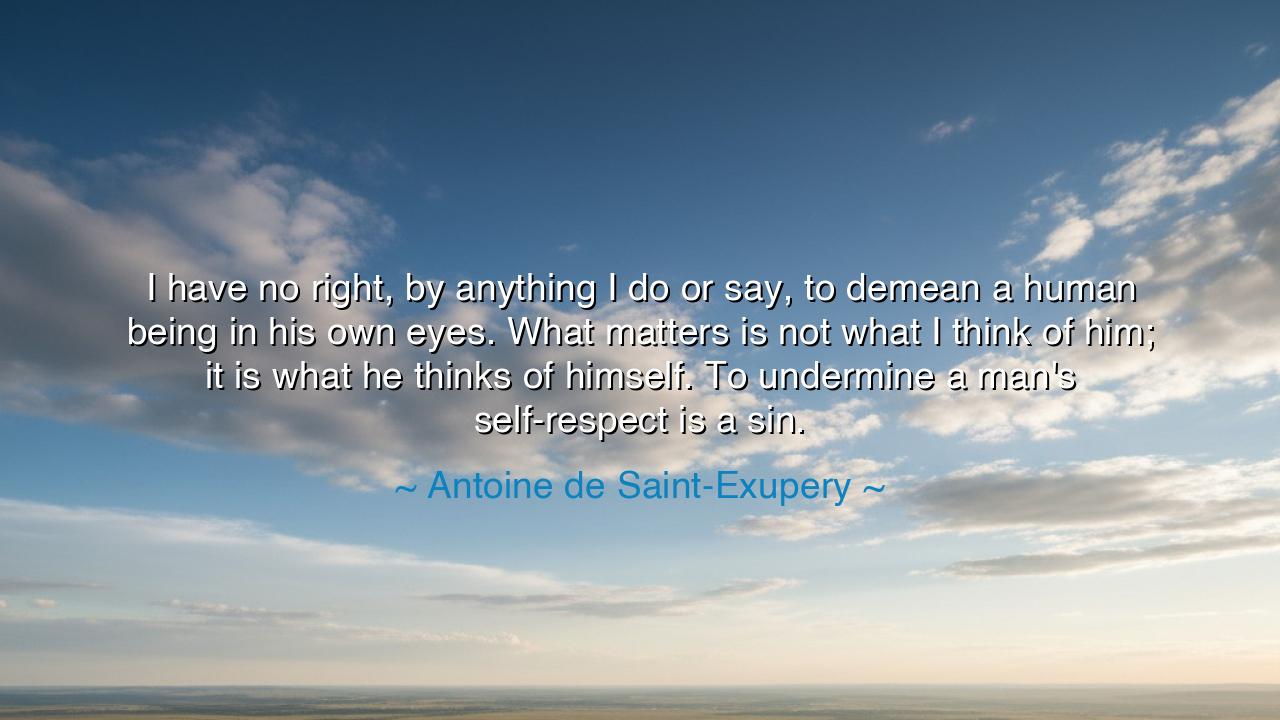
I have no right, by anything I do or say, to demean a human being
I have no right, by anything I do or say, to demean a human being in his own eyes. What matters is not what I think of him; it is what he thinks of himself. To undermine a man's self-respect is a sin.






The words of Antoine de Saint-Exupéry — "I have no right, by anything I do or say, to demean a human being in his own eyes. What matters is not what I think of him; it is what he thinks of himself. To undermine a man's self-respect is a sin." — are heavy with the weight of moral law, as if etched upon the tablets of the soul itself. Here, the aviator and poet speaks not of fleeting courtesies, but of the sacred dignity that lies at the heart of every man. He reminds us that true honor is not bestowed by another’s judgment, but is rooted in a person’s self-respect — and to violate this inner sanctuary is to commit a sin deeper than insult, for it strikes at the very foundation of one’s being.
This origin of the thought is bound to Saint-Exupéry’s own life. He was a man of the skies, flying fragile machines across deserts and storms, confronting the loneliness of vast horizons. In such solitude, he came to understand the preciousness of human dignity. For in the face of danger, what sustains a man is not what others call him, but the fire within that tells him he is capable, worthy, unbroken. To crush that fire in another through scorn or humiliation is to rob him of his very wings.
History offers many examples of this truth. Consider the tragedy of slavery, where men and women were not only chained in body but stripped of their self-respect through mockery, degradation, and denial of their humanity. The physical chains were heavy, but the spiritual chains — the attempt to make a person believe he was less than human — were far worse. Yet it was precisely the restoration of self-respect that gave strength to resist and to rise. Frederick Douglass, once enslaved, spoke of the moment he resisted a beating: in that act, he reclaimed his dignity. He wrote that from then on he was no longer truly a slave, because no man could demean him in his own eyes again.
Saint-Exupéry calls it a sin to undermine another’s dignity, and rightly so. For sin is that which destroys the soul, and to crush the self-respect of another is to wound what is most sacred. It is easy to dismiss or belittle, to throw words carelessly that strike deeper than any blade. But the wise know that words are arrows, and when aimed at the heart of another’s dignity, they pierce in ways that can scar for life. To demean is not strength but cowardice, for it costs nothing to wound and everything to heal.
The teaching is this: if you would walk rightly among men, guard not only your own honor but also the honor of others. Speak in ways that strengthen, not weaken. Correct with gentleness, not mockery. Disagree with firmness, but never with contempt. Remember always that what you say may echo in the chambers of another’s heart for years. You may forget the words you spoke, but the one you demeaned may never forget the wound you caused.
What then should you do? Uplift others. When you see weakness, do not mock, but encourage. When you see failure, do not humiliate, but remind the fallen of their worth. When you must correct, do so in private, with kindness, so that dignity remains intact. Above all, live with the discipline of speech: let no careless word leave your mouth that diminishes another’s self-respect. For your words, like your deeds, are seeds — and they will bear fruit either of bitterness or of strength.
Thus let this teaching endure for the generations: to guard the self-respect of another is a sacred duty, as holy as guarding your own. If you would be noble, let no man leave your presence diminished, but let him depart feeling taller, braver, and more human than before. In this way, you will not only preserve the dignity of others, but you will also strengthen the bonds of humanity itself. And when your own name is spoken, it will be with reverence, for you will be remembered as one who never committed the sin of belittling a soul, but who honored the divine worth in every human being.






AAdministratorAdministrator
Welcome, honored guests. Please leave a comment, we will respond soon